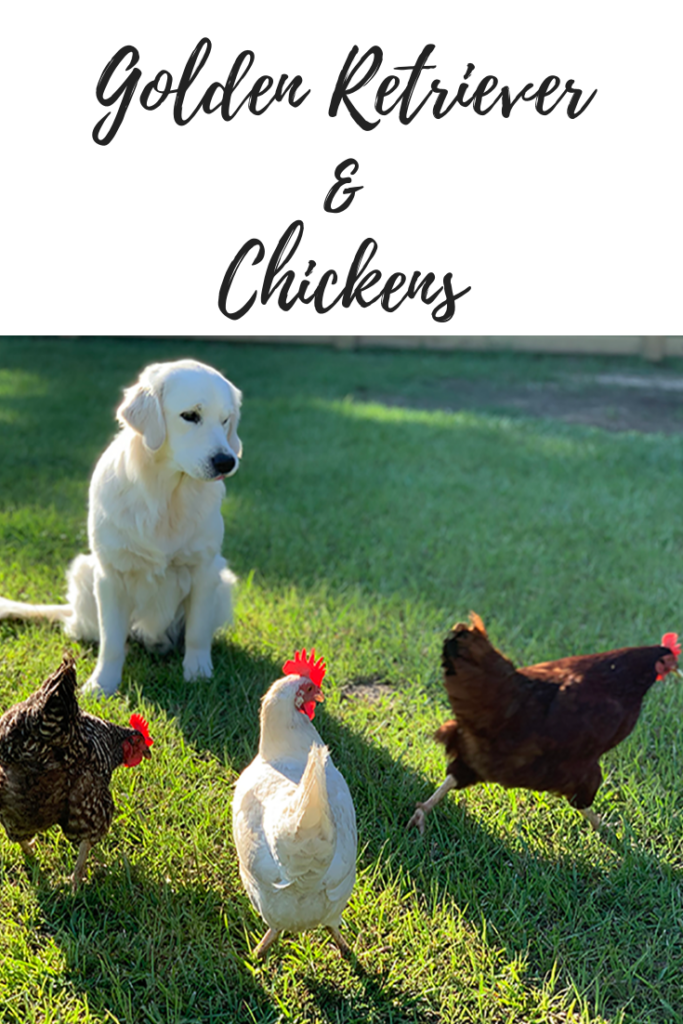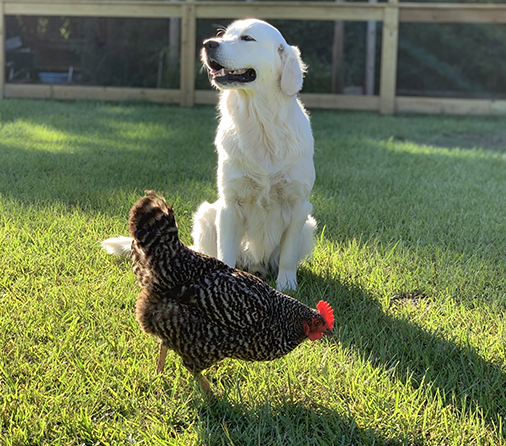
When we brought our golden retriever puppy home we wonder how he would get along with our chickens?
Being a puppy he was easy to introduce to the flock (chickens & ducks) but we worried he would become more interested in them as he got older.
This is our experience with owning a golden retrieve along with having chickens and ducks that free-range.
Table of Contents
Will Golden Retriever Kill Chickens?
A golden retriever will not kill chickens. Goldens can be trained to be very calm and friendly with chickens. When first introducing a golden retriever to your chickens, monitor the interaction between the two.
Training your golden retriever puppy to be friends will your flock is best.
Can You Train a Golden Retriever Not To Kill Chickens?
Goldens are bred to retrieve waterfowl, which gives reason for you to be concerned if they will kill your chickens or ducks.
The good news.
Yes. Golden Retrievers are also very trainable.
They are very intelligent and eager to please, which will make your job more relaxed when it comes to training your golden retriever to get along with the flock.
How To Train Your Golden Retriever Not To Kill Chickens?
To train your golden to play nice with your chickens, pick a command, and stick with the same command when correcting any behavior.
We chose the “leave it” command.
Our golden was a puppy when we started introducing him to the flock. We starting with teaching him the command but introduced to the flock right away. (8 weeks)
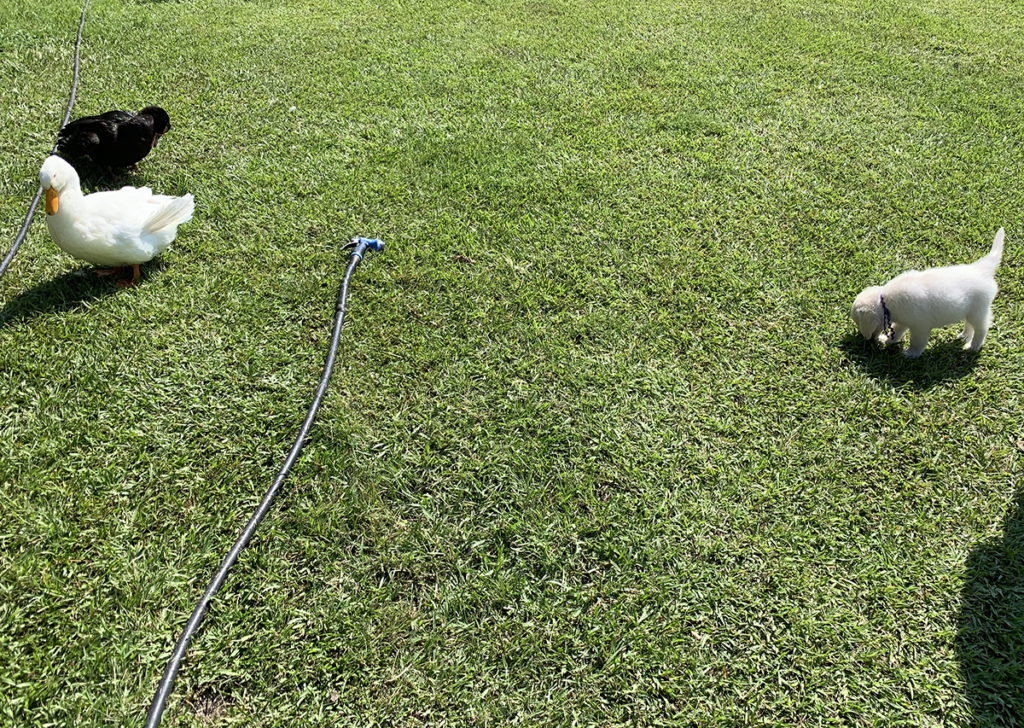
When training your puppy remember..
Consistency is key!
Bring pup out to visit their feather friends quite often to work on training.
For example, we would bring our golden retriever out every morning and afternoon to visit the chickens.
This adventure included watching the chickens run out the coop in the morning and watching mom chase them back in the evenings.
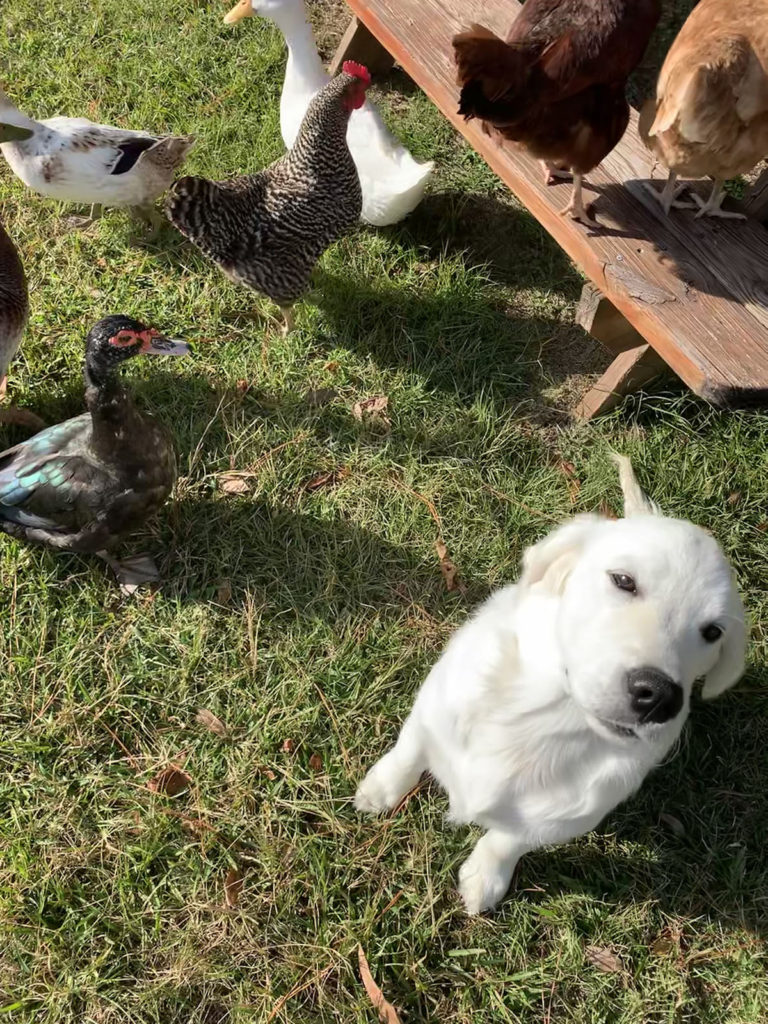
We started with bringing him out and using the “leave it” command when he showed too much interest in a chicken or gave chase; we would use the command “leave it.”
When he followed the command and returned to our side, he would get praised or a treat.
Other times when he would start to show the slightest interest, we would give him a toy, and he would be distracted from the chickens—learning what not to do in the process.
Remember to bring treats for reward and toy or stick to distract.
If your golden is older and you are introducing new chickens to the family.
I would recommend putting your dog on a leash and walking out to visit the flock until you are confident they understand not to chase the chickens.
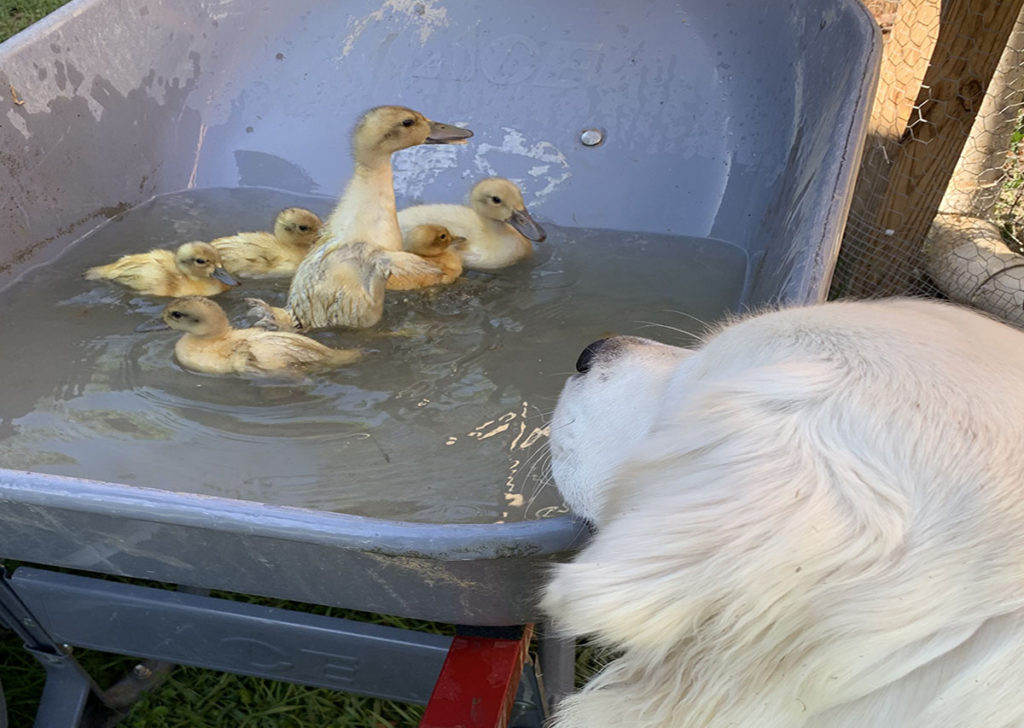
If you have added baby chicks to the family, hold one securely in your hand and let your golden have a sniff. They will be interested in the chirping and baby birds, so introduce them on your terms.
If the golden is a little too curious in the baby chick, start with the “leave it” command or “easy,” so they understand this is not something for them to play with!
Always arm yourself with a pocket full of treats and the “leave it” command.
Once our golden learned what we excepting he would show more interest in a toy or stick and the chickens would go about their business.
What Did We Learn?
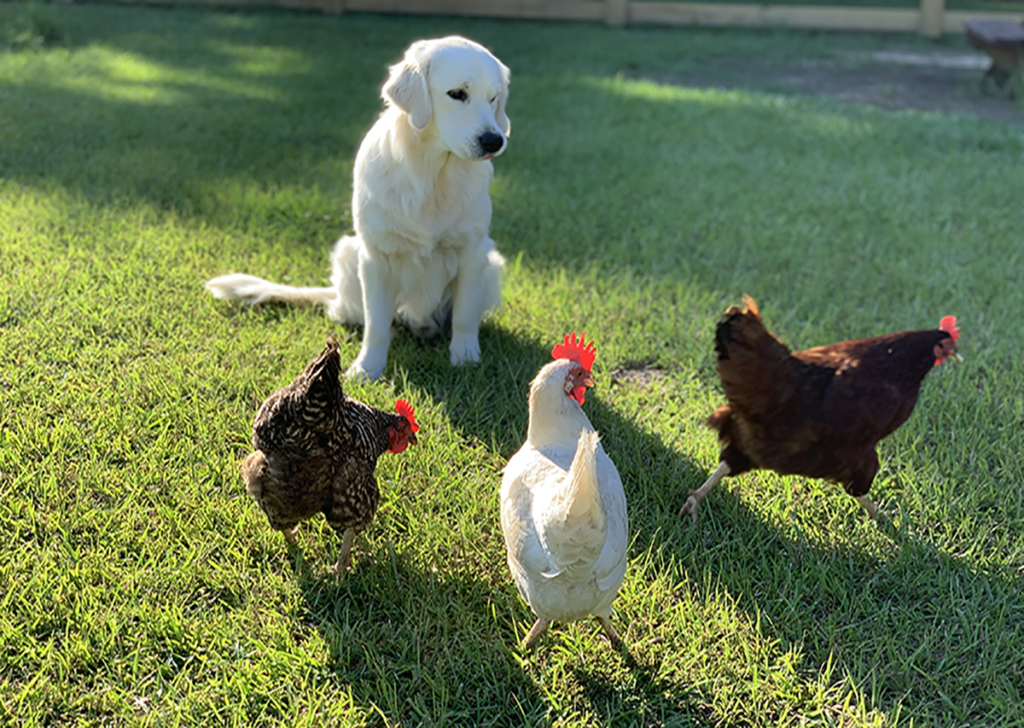
Happy to report our golden has not killed one chicken or duck or any other animal for that matter.
He lives in complete harmony with our chickens.
I would be lying if I said he never gives them a little chase. Occasionally he helps us round them up to put up in the evenings.
Golden retrievers are very obedient; you will discover this when training your golden to live with birds.
Tip: Don’t buy any chicken or duck chew toys
Golden Retrievers Can Get Along With Chicken
If you are having trouble with your golden living with your chickens, remember to be persistent in training.
They are brilliant dogs and understand what you want and are happy to deliver.
Praise and Practice
Once your puppy or dog starts to understand what you want from them, and that’s not to chase the chickens or any other small animal. Remember to praise them not with just treats but by petting, love, and verbal praise. Treats are also good too, but it’s nice to get where you don’t have to have a pocket full of goodies for your pup to learn. Praising them verbally and showing affection when they do right works too.
Remember to practice your dog’s new skill often until it because second nature to them. Now that my dog is older I don’t even have to give the command of “leave it” it’s second nature to him. He doesn’t bother the chickens or rabbits at all. He actually runs from the rooster which is quick entertaining.
We worked on this skill daily the first year of his life mainly because we have chickens that need daily care and we would bring our golden retriever out when we go feed the chicken and let them out. This has been a proven method to stay consistent with the training.
Is A Golden Retriever Right For you?
Are you looking for your first dog and considering a golden retriever. Here are a couple of tips to help you make the decision. Suppose you want a social, friendly breed that enjoys playing and people. There is never a dull moment with a golden retriever; they are always up for anything.
It’s also important to mention the breed is high energy and you will need to commit to meeting your dog’s exercise needs. Golden retrievers need daily exercise such as walking or fetching. A walk should do for older dogs, but if you have a younger dog, they will need some challenging exercise to burn up some energy.
Golden retrievers are gentle giants making them great pets for small children and other pets suck as chickens. They are highly trainable and eager to please. If you put in the time with your golden you can undoubtedly train your dog to get along with chickens or any other small animal. Our golden is also trained to live with our free-ranging rabbits.
As he gets older and continues to work with him, he has become completely not bothered by the chickens or the rabbits. They are highly intelligent and catch on very quickly. It’s important to have space and time for them, and if so, they will make the perfect companion for you and your family.
- Friendly and Social
- High Exercise Needs
- Gentle Giant
- Good with small Children and Small Animals
- Highly Trainable
- Intelligent
- Need Space and Exercise
- Make Great Companion
Update
Our golden is over a year now and he still to date has not hurt a chicken. In fact, he loves and wants to go out by the chickens every day and waits patiently while we tend to the chicken. He has grown out of chasing or caring about the chickens at all. As I mention before he actually runs from the rooster. It only took one time getting chased by the rooster and that was that. So if you have chicken and are getting a golden retriever puppy just know they can exist together but training will be key.
Free Golden Retriever Puppy Potty Schedule
- 7:00 A.M Remove puppy from the crate and immediately take him outside to the potty area.
- 7:15 A.M. Feed your puppy and offer him some water
- 7:30 A.M. Return your puppy to the potty area. Use your commands of “go pee” or “hurry up” remember to give your puppy some praise. Tank pup for a little exercise by walking or playing with him.
- 8: A.M. Put puppy in a crate or the confined area designated for your puppy.
- Remember if you only leave young puppies in the crate for periods of no longer than 4 hours.
- At Home:
- 10:00 A.M. Get puppy out of his crate or sleeping area and take him outside to the potty area
- 10:15 A.M. Walk and Play with the puppy
- 10:30 A.M. Puppy playtime in a safe area
- Noon: Feed puppy second meal
- 12:15 P.M Potty time
- 12:30 P.M. Have a play session and something stimulating mentally for a puppy also does an obedience session
- 1:00 P.M. Put your pup back in the crate for a nap
- 3:00 P.M. Potty time
- 4:00 P.M. Socialize puppy
- 5:00 P.M. Feed puppy last meal
- 5:15 Potty time
- 6:30 P.M. Thank puppy outside for playtime
- 8:00 P.M. Last call for water then potty
- 10:00 P.M. Potty time then crate of his puppy safe place for the night
Most Recommended For Goldens:
To check out all our favorite golden retriever products: Best Golden Retriever Products


